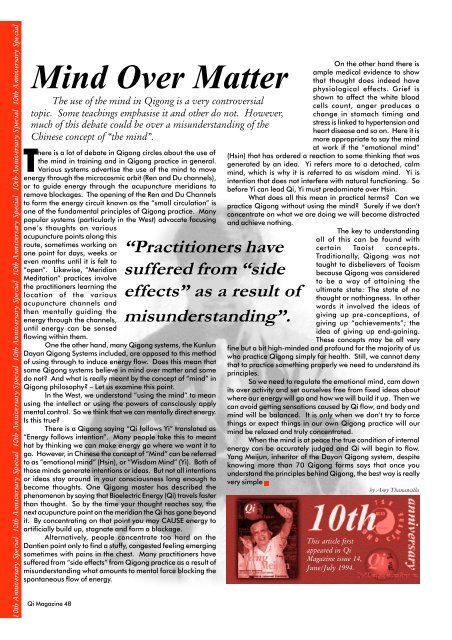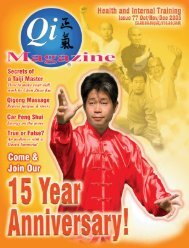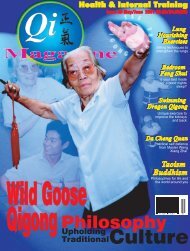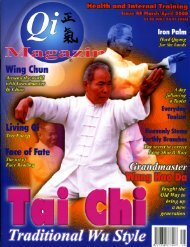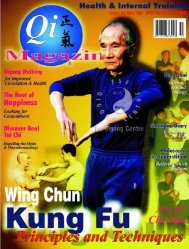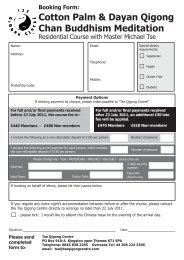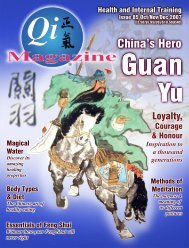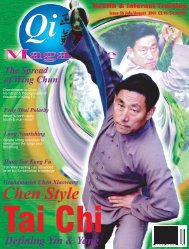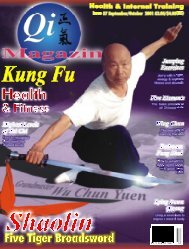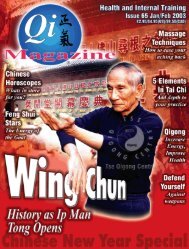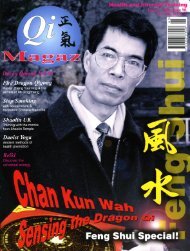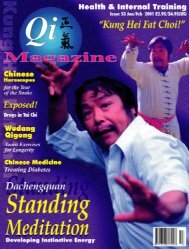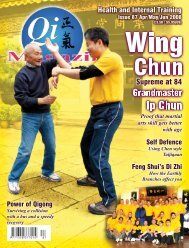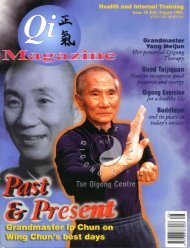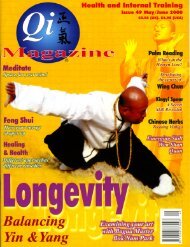You also want an ePaper? Increase the reach of your titles
YUMPU automatically turns print PDFs into web optimized ePapers that Google loves.
10th Anniversary Special 10th Anniversary Special 10th Anniversary Special 10th Anniversary Special 10th Anniversary Special 10th Anniversary Special 10th Anniversary SpecialMind Over MatterThe use of the mind in <strong>Qigong</strong> is a very controversialtopic. Some teachings emphasise it and other do not. However,much of this debate could be over a misunderstanding of theChinese concept of “the mind”.There is a lot of debate in <strong>Qigong</strong> circles about the use ofthe mind in training and in <strong>Qigong</strong> practice in general.Various systems advertise the use of the mind to moveenergy through the microcosmic orbit (Ren and Du channels),or to guide energy through the acupuncture meridians toremove blockages. The opening of the Ren and Du Channelsto form the energy circuit known as the “small circulation” isone of the fundamental principles of <strong>Qigong</strong> practice. Manypopular systems (particularly in the West) advocate focusingone’s thoughts on variousacupuncture points along thisroute, sometimes working onone point for days, weeks oreven months until it is felt to“open”. Likewise, “MeridianMeditation” practices involvethe practitioners learning thelocation of the variousacupuncture channels andthen mentally guiding theenergy through the channels,until energy can be sensedflowing within them.One the other hand, many <strong>Qigong</strong> systems, the KunlunDayan <strong>Qigong</strong> Systems included, are opposed to this methodof using through to induce energy flow. Does this mean thatsome <strong>Qigong</strong> systems believe in mind over matter and somedo not? And what is really meant by the concept of “mind” in<strong>Qigong</strong> philosophy? – Let us examine this point.In the West, we understand “using the mind” to meanusing the intellect or using the powers of consciously applymental control. So we think that we can mentally direct energy.Is this true?There is a <strong>Qigong</strong> saying “Qi follows Yi” translated as“Energy follows intention”. Many people take this to meanthat by thinking we can make energy go where we want it togo. However, in Chinese the concept of “Mind” can be referredto as “emotional mind” (Hsin), or “Wisdom Mind” (Yi). Both ofthose minds generate intentions or ideas. But not all intentionsor ideas stay around in your consciousness long enough tobecome thoughts. One <strong>Qigong</strong> master has described thephenomenon by saying that Bioelectric Energy (Qi) travels fasterthan thought. So by the time your thought reaches say, thenext acupuncture point on the meridian the Qi has gone beyondit. By concentrating on that point you may CAUSE energy toartificially build up, stagnate and form a blockage.Alternatively, people concentrate too hard on theDantien point only to find a stuffy, congested feeling emergingsometimes with pains in the chest. Many practitioners havesuffered from “side effects” from <strong>Qigong</strong> practice as a result ofmisunderstanding what amounts to mental force blocking thespontaneous flow of energy.Qi Magazine 48“Practitioners havesuffered from “sideeffects” as a result ofmisunderstanding”.On the other hand there isample medical evidence to showthat thought does indeed havephysiological effects. Grief isshown to affect the white bloodcells count, anger produces achange in stomach timing andstress is linked to hypertension andheart disease and so on. Here it ismore appropriate to say the mindat work if the “emotional mind”(Hsin) that has ordered a reaction to some thinking that wasgenerated by an idea. Yi refers more to a detached, calmmind, which is why it is referred to as wisdom mind. Yi isintention that does not interfere with natural functioning. Sobefore Yi can lead Qi, Yi must predominate over Hsin.What does all this mean in practical terms? Can wepractice <strong>Qigong</strong> without using the mind? Surely if we don’tconcentrate on what we are doing we will become distractedand achieve nothing.The key to understandingall of this can be found withcertain Taoist concepts.Traditionally, <strong>Qigong</strong> was nottaught to disbelievers of Taoismbecause <strong>Qigong</strong> was consideredto be a way of attaining theultimate state: The state of nothought or nothingness. In otherwords it involved the ideas ofgiving up pre-conceptions, ofgiving up “achievements”; theidea of giving up end-gaining.These concepts may be all veryfine but a bit high-minded and profound for the majority of uswho practice <strong>Qigong</strong> simply for health. Still, we cannot denythat to practice something properly we need to understand itsprinciples.So we need to regulate the emotional mind, cam downits over activity and set ourselves free from fixed ideas aboutwhere our energy will go and how we will build it up. Then wecan avoid getting sensations caused by Qi flow, and body andmind will be balanced. It is only when we don’t try to forcethings or expect things in our own <strong>Qigong</strong> practice will ourmind be relaxed and truly concentrated.When the mind is at peace the true condition of internalenergy can be accurately judged and Qi will begin to flow.Yang Meijun, inheritor of the Dayan <strong>Qigong</strong> system, despiteknowing more than 70 <strong>Qigong</strong> forms says that once youunderstand the principles behind <strong>Qigong</strong>, the best way is reallyvery simpleby Amy ThanawallaThis article firstappeared in QiMagazine issue 14,June/July 1994.


